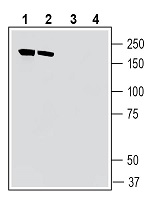Overview
- Peptide (C)KAYQDRLAYLRSHKDE, corresponding to amino acid residues 793 - 808 of human IQGAP1 (Accession P46940). Intracellular.

 Western blot analysis of mouse brain membranes (lanes 1 and 3) and rat brain membranes (lanes 2 and 4):1, 2. Anti-IQGAP1 Antibody (#APZ-055), (1:200).
Western blot analysis of mouse brain membranes (lanes 1 and 3) and rat brain membranes (lanes 2 and 4):1, 2. Anti-IQGAP1 Antibody (#APZ-055), (1:200).
3, 4. Anti-IQGAP1 Antibody, preincubated with IQGAP1 Blocking Peptide (#BLP-PZ055) (#BLP-PZ055). Western blot analysis of human Jurkat T-cell leukemia cell line lysate (lanes 1 and 3) and human MCF-7 breast adenocarcinoma cell line lysate (lanes 2 and 4):1, 2. Anti-IQGAP1 Antibody (#APZ-055), (1:200).
Western blot analysis of human Jurkat T-cell leukemia cell line lysate (lanes 1 and 3) and human MCF-7 breast adenocarcinoma cell line lysate (lanes 2 and 4):1, 2. Anti-IQGAP1 Antibody (#APZ-055), (1:200).
3, 4. Anti-IQGAP1 Antibody, preincubated with IQGAP1 Blocking Peptide (#BLP-PZ055) (#BLP-PZ055).
 Expression of IQGAP1 in mouse cerebellumImmunohistochemical staining of perfusion-fixed frozen mouse brain sections with Anti-IQGAP1 Antibody (#APZ-055), (1:200), followed by goat anti-rabbit-AlexaFluor-488. IQGAP1 immunoreactivity appears in Purkinje neurons (horizontal arrows) and their dendrites (vertical arrows). Cell nuclei are stained with DAPI (blue).
Expression of IQGAP1 in mouse cerebellumImmunohistochemical staining of perfusion-fixed frozen mouse brain sections with Anti-IQGAP1 Antibody (#APZ-055), (1:200), followed by goat anti-rabbit-AlexaFluor-488. IQGAP1 immunoreactivity appears in Purkinje neurons (horizontal arrows) and their dendrites (vertical arrows). Cell nuclei are stained with DAPI (blue).
- Abel, A.M. et al. (2015) Mol. Immunol. 65, 336.
- Li, Z. et al. (2005) J. Biol. Chem. 280, 13871.
- Hedman, A.C. et al. (2015) EMBO Rep. 16, 427.
- Gao, C. et al. (2011) J. Neurosci. 31, 8533.
- Johnson, M. et al. (2011) Int. J. Biochem. Cell Biol. 43, 65.
- Johnson, M. et al. (2009) Cell. Signal. 21, 1471.
IQGAP1 is a 190 kDa (1657 amino acid) protein that is ubiquitously expressed and contains six distinct protein-interacting domains with six coiled coil regions1.
The Ras GTPase-activating-like protein is a scaffold protein involved in regulating various cellular processes; from organizing the actin cytoskeleton, transcription, cell adhesion, and regulating the cell cycle2,3.
IQGAP1 binds to activated CDC42 but does not stimulate its GTPase activity and it may have a role in cell cycle progression following DNA damage1,2. The protein also regulates NR2A NMDA receptor signaling where it influences cognitive processes4. It also regulates MAPK and Wnt/β-catenin signaling pathways5. It is thought to contribute to tumorigenesis by stimulating cell motility and invasion6.
Application key:
Species reactivity key:
Anti-IQGAP1 Antibody (#APZ-055) is a highly specific antibody directed against an epitope of the human protein. The antibody can be used in western blot and immunohistochemistry applications. It has been designed to recognize IQGAP1 from rat, mouse, and human samples.
